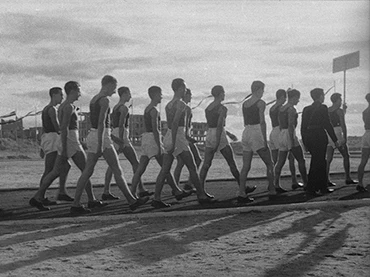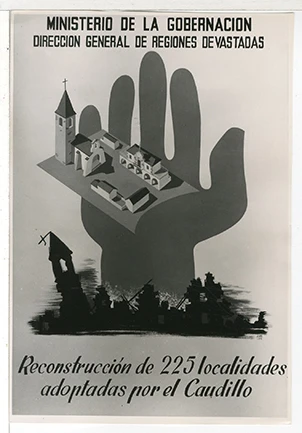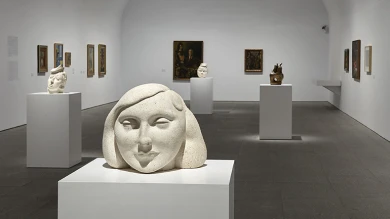Fiercely Human. Cultural Studies about the 40's

Santos Yubero, Martín. Exhibición deportiva en Ciudad Universitaria. Photography b/w, s/f.
Held on 10, 17, 24, 31 May, 07, 14 Jun 2016
The period of autocracy in Spain presents itself as an abominable decade characterised by the triumphant Francoist aesthetic and ideology on all fronts. This series of lectures, in conjunction with the exhibition Campo Cerrado. Spanish Art 1939–1953, debates and calls into question this acknowledgement through the views of six historians and theorists hailing from different fields of study and different generations. The multi-faceted approach to a contradictory and tumultuous time enables the recovery and analysis of silent formations of cultural dissidence, the reality of external and internal exile, popular forms as a space of play and transgression, the notion of sacrifice in painting, and the persisting nostalgia and wounds in literary texts. The title of the series borrows its name from Fiercely Human Angel, Blas de Otero’s book of poems, which, along with Children of Wrath by Dámaso Alonso, characterises this decade as a period of survival and rawness in equal measure.
The series’ full programme will be presented in the coming days.
Organised by
Museo Reina Sofía
Ongoing recognition of credits with the Complutense, Carlos III and Autónoma Universities of Madrid.
Participants
Mari Paz Balibrea is a professor of cultural studies in the Department of Cultures and Languages Birkbeck at the University of London. Her publications include En la tierra baldía. Manuel Vázquez Montalbán y la izquierda española en la postmodernidad (El Viejo Topo, 1999) and Tiempo de exilio. Una mirada crítica a la modernidad española desde el pensamiento republicano en el exilio (Montesinos, 2007). She is the coordinator, co-editor and co-author of the project Líneas de fuga. Hacia otra historiografía del exilio cultural republicano español (Akal, 2017), and is currently co-editing the collective book María Zambrano Amongst the Philosophers: A Reconsideration.
Laurence Bertrand-Dorleac is a professor of art history at the Paris Institute of Political Studies (Sciences Po). She is also the author of publications such as Histoire de l’art. Paris 1940-1944 (Publications de la Sorbonne, 1986), Art of the Defeat. France 1940–1944 (Getty Research Institute, 2008), L'ordre sauvage. Violence, dépense et sacré dans l'art des années 1950-1960 (Gallimard, 2004) and Après la guerre (Gallimard, 2010), among others. Furthermore, she has jointly curated the exhibition L’art en guerre, France 1938-1947 (Musée d’art moderne de la Ville de Paris, 2012 and Guggenheim de Bilbao, 2013) and curated Les désastres de la guerre. 1800-2014 (Louvre-Lens, 2014).
Jordi Gracia is a professor of Spanish literature at the University of Barcelona. His publications include Estado y cultura. El despertar de una conciencia crítica (Anagrama, 1996), La resistencia silenciosa (Anagrama, 2004) and A la intemperie. Exilio y cultura en España (Anagrama, 2010). He is also the author of La vida rescatada de Dionisio Ridruejo (Anagrama, 2008) and co-author, together with Domingo Ródenas, of the literary history Derrota y restitución de la modernidad: 1939-2010 (Crítica, 2011). His latest book is the cultural biography José Ortega y Gasset (Taurus, 2014).
Jo Labanyi is a professor of Spanish literature and culture at New York University. She is a specialist in cultural studies and cultural history in modern Spain, and her recent publications are made up of Spanish Literature (Oxford University Press, 2010) and A Companion to Spanish Cinema (Blackwell, 2015), edited alongside Tatjana Pavlovic. Furthermore, she is co-author of A Cultural History of Modern Spanish Literature and Cinema and the Mediation of Everyday Life in 1940s and 1950s Spain: An Oral History (both books are forthcoming), and she is writing a monographic study on Spanish cinema between the years 1939 and 1953, provisionally entitled Reading Cinema under Dictatorship. She is also the founder and director of the Journal of Spanish Cultural Studies.
Germán Labrador Méndez is a professor of literature and cultural history at the University of Princeton. He has written two books on the study of counterculture movements and activism in 1970s literature, entitled Letras arrebatadas, Poesía y química en la transición española (Devenir, 2009) and Culpables por la literatura. Imaginación política y contracultura en la transición española (1968-1984) [forthcoming]. At the present time he is conducting investigations into the ephemeral productions and forms of political resistance that have recently taken place in Spain, in a project provisionally entitled Luces efímeras. La lógica cultural de la crisis española.
Jesusa Vega is a professor of modern and contemporary art history at the Autonomous University of Madrid. She has been an Honorary Research Fellow at the Department of Iberian & Latin American Studies, School of Arts, Birkbeck, University of London, and held the King Juan Carlos I Chair of Spanish Culture at New York University in 2011. She is currently lead researcher in the project La Historia del Arte en España: devenir, discursos y propuestas. In addition to visual culture from the 18th and 19th centuries, she has also written about the history and methodology of art history, most notably in the publication El descubrimiento del arte español. Cossío, Lafuente, Gaya Nuño (Novatores, 2008), together with Javier Portús, and in the articles “Del pasado al futuro de la Historia del Arte en la Universidad Española” (Ars Longa. Cuadernos de Arte, 2007) and “Points de repère pour l'histoire de l'art en Espagne” (Perspective, 2009).


Más actividades

Aesthetics of Peace and Desertion Tactics
8 October 2025 – 24 June 2026
The study group Aesthetics of Peace and Tactics of Desertion: Prefiguring New Pacifisms and Forms of Transitional Justice proposes a rethinking—through both a theoretical-critical and historical-artistic lens—of the intricate network of concepts and practices operating under the notion of pacifism. A term not without contestation and critical tension, pacifism gathers under its name a multiplicity of practices—from anti-militarism and anti-war movements to non-violence activism—while simultaneously opening urgent debates around violence, justice, reparation, and desertion. Here, pacifism is not conceived as a moral doctrine, but as an active form of ethical and political resistance capable of generating aesthetic languages and new positions of social imagination.
Through collective study, the group seeks to update critical debates surrounding the use of violence and non-violence, as well as to explore the conflict of their representation at the core of visual cultures. In a present marked by rearmament, war, genocide, and the collapse of the social contract, this group aims to equip itself with tools to, on one hand, map genealogies and aesthetics of peace—within and beyond the Spanish context—and, on the other, analyze strategies of pacification that have served to neutralize the critical power of peace struggles. Transitional and anti-punitive justice proposals will also be addressed, alongside their intersections with artistic, visual, and cinematic practices. This includes examining historical examples of tribunals and paralegal activisms initiated by artists, and projects where gestures, imaginaries, and vocabularies tied to justice, reparation, memory, and mourning are developed.
It is also crucial to note that the study programme is grounded in ongoing reflection around tactics and concepts drawn, among others, from contemporary and radical Black thought—such as flight, exodus, abolitionism, desertion, and refusal. In other words, strategies and ideas that articulate ways of withdrawing from the mandates of institutions or violent paradigms that must be abandoned or dismantled. From feminist, internationalist, and decolonial perspectives, these concepts have nourished cultural coalitions and positions whose recovery today is urgent in order to prefigure a new pacifism: generative, transformative, and radical.
Aesthetics of Peace and Tactics of Desertion, developed and led by the Museo Reina Sofía’s Studies Management, unfolds through biweekly sessions from October to June. These sessions alternate between theoretical discussions, screenings, work with artworks and archival materials from the Museo’s Collection, reading workshops, and public sessions. The group is structured around sustained methodologies of study, close reading, and collective discussion of thinkers such as Judith Butler, Elsa Dorlin, Juan Albarrán, Rita Segato, Sven Lütticken, Ruth Wilson Gilmore, and Franco “Bifo” Berardi; historical episodes such as the anti-nuclear and anti-arms race movement in Spain; and the work of artists and activists including Rojava Film Commune, Manuel Correa and the Oficina de Investigación Documental (Office for Documentary Investigation), and Jonas Staal, among other initial cases that will expand as the group progresses.

Institutional Decentralisation
Thursday, 21 May 2026 – 5:30pm
This series is organised by equipoMotor, a group of teenagers, young people and older people who have participated in the Museo Reina Sofía’s previous community education projects, and is structured around four themed blocks that pivot on the monstrous.
This fourth and final session centres on films that take the museum away from its axis and make it gaze from the edges. Pieces that work with that which is normally left out: peripheral territories, unpolished aesthetics, clumsy gestures full of intent. Instead of possessing an institutional lustre, here they are rough, precarious and strange in appearance, legitimate forms of making and showing culture. The idea is to think about what happens when central authority is displaced, when the ugly and the uncomfortable are not hidden, when they are recognised as part of the commons. Film that does not seek to be to one’s liking, but to open space and allow other ways of seeing and inhabiting the museum to enter stage.

Intergenerationality
Thursday, 9 April 2026 – 5:30pm
This series is organised by equipoMotor, a group of teenagers, young people and older people who have participated in the Museo Reina Sofía’s previous community education projects, and is structured around four themed blocks that pivot on the monstrous.
The third session gazes at film as a place from which to dismantle the idea of one sole history and one sole time. From a decolonial and queer perspective, it explores films which break the straight line of past-present-future, which mix memories, slow progress and leave space for rhythms which customarily make no room for official accounts. Here the images open cracks through which bodies, voices and affects appear, disrupting archive and questioning who narrates, and from where and for whom. The proposal is at once simple and ambitious: use film to imagine other modes of remembering, belonging and projecting futures we have not yet been able to live.

Remedios Zafra
Thursday March 19, 2026 - 19:00 h
The José Luis Brea Chair, dedicated to reflecting on the image and the epistemology of visuality in contemporary culture, opens its program with an inaugural lecture by essayist and thinker Remedios Zafra.
“That the contemporary antifeminist upsurge is constructed as an anti-intellectual drive is no coincidence; the two feed into one another. To advance a reactionary discourse that defends inequality, it is necessary to challenge gender studies and gender-equality policies, but also to devalue the very foundations of knowledge in which these have been most intensely developed over recent decades—while also undermining their institutional support: universities, art and research centers, and academic culture.
Feminism has been deeply linked to the affirmation of the most committed humanist thought. Periods of enlightenment and moments of transition toward more just social forms—sustained by education—have been when feminist demands have emerged most strongly. Awareness and achievements in equality increase when education plays a leading social role; thus, devaluing intellectual work also contributes to harming feminism, and vice versa, insofar as the bond between knowledge and feminism is not only conceptual and historical, but also intimate and political.
Today, antifeminism is used globally as the symbolic adhesive of far-right movements, in parallel with the devaluation of forms of knowledge emerging from the university and from science—mistreated by hoaxes and disinformation on social networks and through the spectacularization of life mediated by screens. These are consequences bound up with the primacy of a scopic value that for some time has been denigrating thought and positioning what is most seen as what is most valuable within the normalized mediation of technology. This inertia coexists with techno-libertarian proclamations that reactivate a patriarchy that uses the resentment of many men as a seductive and cohesive force to preserve and inflame privileges in the new world as techno-scenario.
This lecture will address this epochal context, delving into the synchronicity of these upsurges through an additional parallel between forms of patriarchal domination and techno-labor domination. A parallel in which feminism and intellectual work are both being harmed, while also sending signals that in both lie emancipatory responses to today’s reactionary turns and the neutralization of critique. This consonance would also speak to how the perverse patriarchal basis that turns women into sustainers of their own subordination finds its equivalent in the encouraged self-exploitation of cultural workers; in the legitimation of affective capital and symbolic capital as sufficient forms of payment; in the blurring of boundaries between life and work and in domestic isolation; or in the pressure to please and comply as an extended patriarchal form—today linked to the feigned enthusiasm of precarious workers, but also to technological adulation. In response to possible resistance and intellectual action, patriarchy has associated feminists with a future foretold as unhappy for them, equating “thought and consciousness” with unhappiness—where these have in fact been (and continue to be) levers of autonomy and emancipation.”
— Remedios Zafra

27th Contemporary Art Conservation Conference
Wednesday, 4, and Thursday, 5 March 2026
The 27th Contemporary Art Conservation Conference, organised by the Museo Reina Sofía’s Department of Conservation and Restoration, with the sponsorship of the Mapfre Foundation, is held on 4 and 5 March 2026. This international encounter sets out to share and debate experience and research, open new channels of study and reflect on conservation and the professional practice of restorers.
This edition will be held with in-person and online attendance formats, occurring simultaneously, via twenty-minute interventions followed by a five-minute Q&A.
